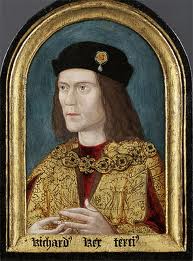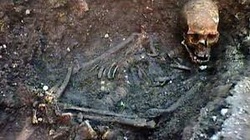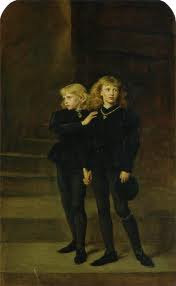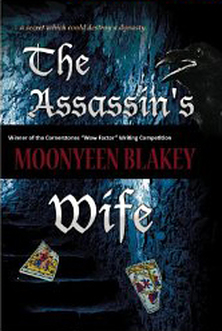
Please take the time to discover the influence behind the book and then, if you wish, join us in our ‘Hysterical Book-Blast’ today Saturday 15th by downloading your own copy of ‘The Assassins Wife’ and sharing this blog post.
So without further ado:

Last year's discovery of Richard III's bones under a carpark in Leicester, raised more than new interest in the history of this much maligned king. It stirred the spectres of two, lost, little, noble boys said to haunt the Garden Tower.
Who were these waifs in black velvet, doomed to cling hand-clasped and forlorn, confronting us perpetually with their abject misery? Who could have abandoned them to such a fate?
Those primary school-children who studied history during the 1960s might have had some inkling. According to a 'potted' Children's History Book Series published by Unstead and used throughout schools for 7-11 years in England, these small boys belonged to the Royal House of York. They were in fact the sons of Edward IV, the dashing Yorkist king who took the crown from poor, mad Henry VI of the Royal House of Lancaster. Again, according to Unstead, whole swathes of history could be reduced to just a few relevant sentences summing up the entire later 15th century history of England to something like: 'The rival barons fought for the crown and the strongest set himself up as king.' (Sorry, girls, only manipulative, scheming princesses/noblewomen stood any chance of influencing the menfolk--and then probably by using the usual methods!)
It seemed the peasant population drifted along in some thick miasma of ignorance merely 'obeying orders' and benefiting nothing from the various changes on either side. Kings came and went, princesses were bought and sold, nobles swapped sides and embraced underhand deals, and Richard Neville, the wily Earl of Warwick, manoeuvred all the pieces, like a giant puppet-master, in this fascinating Game of Thrones.

Of course the Richard III Society, championed by the passionate Phillipa Langley, refused to accept Richard's infamy. Presenting the public with a charming, romantic reconstruction of the king's head, they quickly won huge support. I suspect many who saw the Unstead History Book refused to believe such a man could have smothered his nephews single-handed. Certainly I was never convinced.
But those two boys--Edward, Prince of Wales, eldest son to Edward IV, and young Richard, Duke of York, his brother, disappeared mysteriously in1486. So what became of them?
The struggle for power is never pretty. Whilst 15th Century England's noble cousins battled for the throne, desperate to provide the country with the strongest ruler, to maintain England's powerful position in Europe, and ensure the longevity of the ruling family, various wicked deeds were performed 'for the best'. Doubtless the princes' murder was such a one.
Henry VI's reign demonstrated the disaster of having a minor on the throne. No one wanted a similar situation. A united family created strength and security. Noble girls proved useful assets in cementing firm alliances. Eventually everyone might be expected to accept what seemed most expedient for such dangerous times. In this case, to exclude the young princes and plump for loyalty, strength and experience. The logical choice had to be Richard III.
Is it possible that people should desert the princes' cause so quickly? No doubt the commons recalled Edward IV --that handsome, courageous, warrior-king who'd sired` them, with admiration and nostalgia. But the people were sick and tired of war. His memory faded into a kind of Mills and Boon Romance--a gorgeous image which had been beautifully created and accentuated by the rumours of his secret marriages and dangerous liaisons. But who wanted to begin on another era of warfare and intrigue? Edward's wife, the fabled beauty Elizabeth Wydeville, was never popular. She had proved greedy and ambitious ,promoting her own family beyond the old nobility. People feared she would take the real power behind the throne once her son was crowned. Perhaps it was time to make some drastic changes?
People will see what they want to see. Avoiding close examination of the facts allows one to create a kind of vague, rosy glow over the past. Perhaps it was time to let the princes go...? Perhaps the trail of secrets concerning their disappearance should not be unravelled after all?
Of course many people stood to profit by their removal. Historians argue still as to who might have plotted and schemed for their demise. The first name which springs to mind is probably Henry Tudor, product of Margaret Beaufort's cold, religious fanaticism, the boy on whom she lavished all her` attention, Determined he should be king, Margaret, clever as a snake, wound her coils about all those noble persons who might aid her to fulfill this ambition--an ambition she believed to be a part of his destiny.
And what about Harry Buckingham? Disgruntled member of the old nobility, forced into an arranged marriage with a dreaded Wydeville princess, old friend of Richard III, why did he suddenly turn rebel?
There are so many possibilities when it comes to choosing villains!
But perhaps it was just sheer exhaustion which made the people of England turn their backs on the princes?
We all love a change. The new order beckoned. If only the country could forget about fighting and get back on its feet again... A change is as good as a rest?

Now, with all this knowledge at their fingertips, and the bones of King Richard III in their capable hands, all the scientists need is the Queen's permission to re-examine those mysterious finds.
Why then, is she so reluctant to allow this???!

Blurb:
Second Sight is dangerous…
Nan's visions of two noble boys imprisoned in a tower frighten her village priest. The penalty for witchcraft is death.
Despite his warnings, Nan’s determination to save these boys launches her on a nightmare journey. As fifteenth-century England teeters on the edge of civil war, her talent as a Seer draws powerful, ambitious people around her.
Not all of them are honourable.
Twists of fate bring her to a ghost-ridden house in Silver Street where she is entrusted with a secret which could destroy a dynasty.
Pursued by the unscrupulous Bishop Stillington, she finds refuge with a gypsy wise-woman, until a chance encounter takes her to Middleham Castle. Here she embarks on a passionate affair with Miles Forrest, the Duke of Gloucester’s trusted henchman. But is her lover all he seems?
"The author reveals through a vivid, gripping narrative the fear, violence and chaos of that time. Will the assassin's wife have the power to alter the course of history? Read this book and find out." - Paul Sutherland, Multi-Published Author and Editor
"…a vivid and visceral journey into the darkest hearts of men during the Wars of the Roses… An incredible, unforgettable story, surely made for the screen. Moonyeen Blakey is a major new talent to watch." - Sally Spedding, Award-Winning Mystery Author of Cold Remains
My five star review
“I love books of this period and was attracted to this one by the additional premise of a main character with the dangerous gift of "sight"
From the outset I was captivated by Nan and the way her character was carefully and believably, developed throughout this book. The prose was quite beautiful, and a joy to savour. The period detail and setting drew me in, in such a natural and effortless way, a compliment indeed to the author. Nan's visions served to rank up the suspense as they increased in number and intensity. The reaction of both Nan and those around her fully illustrating the fear and suspicion, abound in those times.
I thoroughly enjoyed this exciting and well researched tale. This is a must read for those who enjoy historical fiction.”
To grab your own copy here are the links:
Amazon .com
Amazon.co.uk
Happy Reading ...
Babs x
 RSS Feed
RSS Feed
